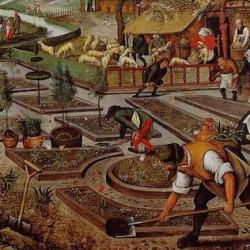Among the German writers that Liebersohn ( The Return of the Gift ) discusses, Karl Bucher stands out as a crucial figure. Like other German economists, Bucher objected to what he saw as abstract British economic theories, which attempted to universalize the historically specific British experience. Beyond other theorists, and against liberal theorists like Smith and Ricardo, he argued that the very notion of a natural economic impulse was an error.
Human beings, he acknowledged, naturally seek self-preservation and self-interest, but this takes different forms in different times and places: “estimating the degree of displeasure of not satisfying a need, estimating the displeasure of doing work to achieve an end, comparing the two forms of displeasure, and deciding which involves the lesser sacrifice” – these are learned habits of thought, not instinctive (p. 48).
For Bucher, “Economic man, and more important, the values of economic man, were the historical and logical beginning he wishes to historicize . . . .
“his aim was to stop projecting backwards from the mentality of one’s contemporaries and instead come to an empirical knowledge of the distinctive psychological make-up of economic actors in different times and places. Economic behavior as the rational exercise of choice between alternatives for a minimum efforts and a maximum of gain was acquired behavior; entire societies had had to acquire it, and every child had to relearn it; mature adults in modern society followed it to different degrees” (48).
If this were the case, and “there was not a natural economic behavior intrinsic to human beings in all times and place,” then it must be possible to trace a “history [of] the acquisition of this kind of activity.” Bucher insisted that such a history had to be built on ethnographical observation rather than on fanciful “Robinsonade” models. Unfortunately, Bucher knew little of the ethnographic research that had been going on in Britain and France for decades, research that had already challenged simplistic models of economic and social development.
Bucher’s own history was in the end quite abstract in the same way that the British theories had been, a variation of the liberal myth already found in Hobbes. The one difference was “his historicization of [Hobbesian] brutishness.” Like British liberals, Bucher assumed that human beings are natural individualists (50-51).
Later, under the influence of Wilhelm Gaul’s 1914 dissertation on gifts, Bucher came to recognize that “Gift giving plays a large role among primitive peoples everywhere . . . . But the gifts are never given without expectation of a response, in the expectation of a return gift, whose character the initial giver can help to decide.” From there, Bucher began to sift through the pre-modern history of Europe to find evidence of “gift cultures”: “”In Germany itself the word schenken (meaning ‘to pour,’ and the root of Geschenk or ‘gift’) revealed the deep history of gift giving in the simplest gestures, such as offering drinks, in the ancient past. Going through folklore literature, he pointed out how common gifts had been for important life events in Europe, above all marriage” (57).














